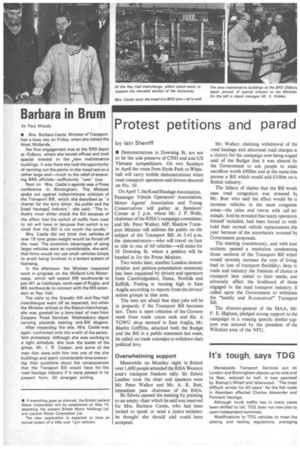Protest petitions and parad
Page 30

If you've noticed an error in this article please click here to report it so we can fix it.
by lain Sherriff
• Demonstrations in Downing St. are not to be the sole preserve of CND and anti-US Vietnam sympathizers. On two Sundays in April the route from Hyde Park to Whitehall will carry mobile demonstrations when road transport operators and drivers descend on No. 10.
On April 7, the Road Haulage Association, Passenger Vehicle Operators' Association, Motor Agents' Association and Young Conservatives will gather at Speakers' Corner at 2 p.m. where Mr. J. P. Wells, chairman of the RH.A's campaign committee, and Mr. Peter Walker, MP, Shadow Transport Minister will address the public on the subject of the Transport Bill. At 3.45 p.m. the demonstrators—who will travel on foot or ride in one of 60 vehicles—will make for 10 Downing St. where a petition will be handed in for the Prime Minister.
Two weeks later, another London demonstration and petition-presentation ceremony has been organized by drivers and operators from Cambridgeshire, Essex, Norfolk and Suffolk. Feeling is running high in East Anglia according to reports from the drivers' action groups in that area.
The men are afraid that their jobs will be in jeopardy if the Transport Bill becomes law. There is open criticism of the Government from trade union rank and file. A TGWU shop steward in East Anglia, Mr. Martin Griffiths, attacked both the Budget and the Bill in a public statement last week; he called on trade unionists to withdraw their political levy.
Overwhelming support Meanwhile on Monday night in Bristol over 1,600 people attended the RHA Western area's transport freedom rally. Sir Edwin Leather took the chair and speakers were Mr. Peter Walker and Mr. A. R. Butt, immediate past chairman of the RHA.
Sir Edwin opened the meeting by pointing to an empty chair which he said was reserved for Mrs. Barbara Castle, who had been invited to speak or send a junior minister, he thought she should and could have accepted. Mr. Walker, claiming withdrawal of the road haulage and abnormal load charges a: a victory for the campaign now being waged said of the Budget that it was absurd fo: the Government to ask people to mak( sacrifices worth £900m and at the same tim( pursue a Bill which would add £100m on a British industry.
The fallacy of claims that the Bill wouk ease road congestion was stressed b3 Mr. Butt who said the effect would be tc increase vehicles in the most congestec areas—the cities and towns with rail ter rninals. And he revealed that many operators himself included, had been forced to with hold their normal vehicle replacements thil year because of the uncertainty aroused by Government proposals.
The meeting unanimously, and with Iouc acclaim, passed a resolution condemning those sections of the Transport Bill which would severely increase the cost of living; lead to loss of transport flexibility; deny tc trade and industry the freedom of choice ol transport best suited to their needs; and adversely affect the livelihood of those engaged in the road transport industry. II called upon the Government to withdraw the "hastily and ill-conceived" Transport Bill.
The director-general of the MAA, Mr. F. E. Higham, pledged strong support to the campaign in a rousing speech; similar support was assured by the president of the Wiltshire area of the NFU.
























































































































